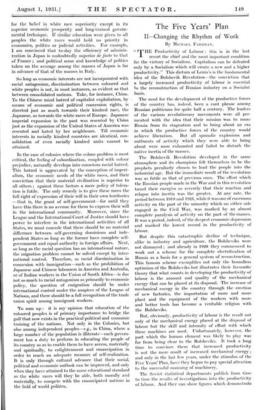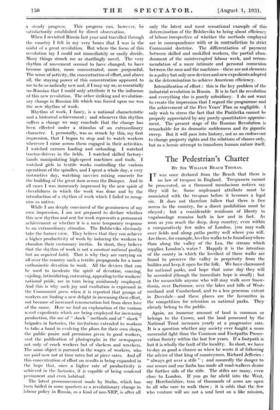By MICI1AEL FARBNIAN.
"THE Productivity of Labour : this is in the last resort the chief and the most important condition for the victory of Socialism. Capitalism can be defeated only by a Socialism which will create a new and a higher productivity." This dictum of Lenin's is the fundamental idea of the Bolshevik Revolution—the conviction that a largely increased productivity of labour is essential to the reconstruction of Russian industry on a Socialist basis.
The need for the development of the productive forces of the country has, indeed, been a cant phrase among Russian politicians for quite half a century. .The leaders of the various revolutionary movements were all per- meated with the idea that their mission was to rouse Russia from its stagnation and to bring about an era in which the productive forces of the country would achieve liberation. But all sporadic explosions and outbursts of activity which they were able to bring about were soon exhausted and failed to disturb the native inertia of the masses.
The Bolshevik Revolution developed in the same atmosphere and its champions felt themselves to be the prophets peculiarly chosen to lead the people into the industrial age. But the immediate result of the revolution was as futile as that of previous ones. The effort which the Russian people made in the War and in this revolution taxed their energies so severely that their reaction and relapse into inertia was the greater. At any rate, the period between 1918 and 1921, while it was one of enormous activity on the part of the minority which on either side engaged in the Civil War, was marked by an almost complete paralysis of activity on the part of the masses. It was a period, indeed, of the deepest economic depression and marked the lowest record in the productivity of labour.
But despite this catastrophic decline of technique, alike in industry and agriculture, the Bolsheviks were not dismayed ; and already in 1920 they commenced to work out a scheme for the complete electrification of Russia as a basis for a general system of reconstruction. This famous scheme exemplifies not only the boundless optimism of the Bolsheviks but illustrates their favourite theory that what counts in developing the productivity of labour is the amount and quality of the mechanical energy that can be placed at its disposal. The increase of mechanical energy in the country through the erection of new factories, the importation of more and more plant and the equipment of the workers with more and better tools has become a veritable religion with the Bolsheviks.
But, obviously, productivity of labour is the result not only of the mechanical energy placed at the disposal of labour but the skill and intensity of effort with which these machines are used. Unfortunately, however, the part which the human element was likely to play was far from being clear to the Bolsheviks. It took a long time to convince them that increased productivity is not the mere result of increased mechanical energy ; and only in the last few years, under the stimulus of the Five Years' Plan, have they begun to pay special attention to the successful manning of machinery.
The Soviet statistical departments publish from time to time the results of investigations into the productivity of labour. And they can show figures which demonstrate a steady progress. This progress can, however,- be satisfactorily established by direct observation.
When I revisited Russia last year and travelled through the country I felt in my very bones that I was in the midst of a great revolution. But where the focus of this revolution lay I could not immediately or easily decide. Many things struck me as startlingly novel. The very rhythm of movement seemed to have changed, to have become quicker, more - concentrated, more purposeful. The sense -of activity, the concentration of effort, and above all, the staying power of this concentration appeared to me to be so radically new and, if I may say so, so essentially un-Russian that I could only attribute it to the -influence of this new revolution. The other striking and revolution- ary change in Russian life which was forced upon me was the new rhythm -of work.
Rhythm of work, I fancy, is a national characteristic and a historical achievement ; and wheneVer. this -rhythm suffers a change we may conclude that the change has been effected under a stimulus of an extraordinary character. L personally, was so struck by this, my first impression, that I began to stop and to watch • workers wherever I came across them engaged in their activities. I watched carmen loading and unloading. I watched tractor-drivers in the fields. I watched skilled factory- hands manipulating high-speed machines and tools. I watched girls. in textile works controlling the various operations of the spindles, and I spent a whole day, a very instructive day, watching navvies mixing concrete for the building of the great dam across the Dnieper. And in all cases I was immensely impressed by the new spirit of cheerfulness in which the work was done and by the introduction of a rhythm of work which I failed to recog- nize as native.
While I am deeply convinced of the genuineness of my own impression, I am not prepared to declare whether this new rhythm and zest for work represents a permanent achievement or whether it is a mere temporary response to an extraordinary stimulus. The Bolsheviks obviously take the former view. They believe that they can achieve a higher productivity of work by inducing the workers to abandon their customary inertia. In short, they believe that the rhythm of work is not a constant national quality but an acquired habit. That is why they are carrying on all over the country such a terrific propaganda for a more enthusiastic devotion to work. All the devices that can be used to inculcate the spirit of devotion, coaxing, cajoling,. intimidating, entreating, appealing to the workers' national pride, are in turn being assiduously employed. And this is why such joy and exultation is expressed in the Communist. press when it is reported that groups of workers are finding a new delight in increasing their effort, not because, of increased remuneration but from sheer love of the cause. Here we find an explanation of the various novel expedients which are being employed for increasing production, the use of " shock " methods and of " shock " brigades in factories, the invitations extended to workers to take a hand in evolving the plans for their own shops, the public praise and premiums given to good workers, and the publication of photographs in the newspapers not only of crack workers but of slackers and wreckers. The same object is pursued in the wages of workers, who are paid now not at time rates but at piece rates. And all this concentration of effort on results is being expanded in the hope that, once a higher rate of productivity is achieved in the factories, it is capable of being rendered permanent and even habitual. . .
The latest pronouncement made by Stalin, which has been hailed in some quarters as a revolutionary change in labour policy in Russia, as a kind of neo-NEP, is after all only the latest and most sensational example of this determination of the Bolsheviks to bring about efficiency of labour irrespective of whether the methods employed are in correspondence with or in contradiction to strict Communist doctrine. The differentiation of payment between skilled and unskilled workers, the partial aban- donment of the uninterrupted labour week, and recorm• mendation of a more intimate and personal connexion between the men and the machines—these are not elements in a policy but only new devices and new expedients adbpted in the determination to achieve American efficiency.
Intensification of -effort : this- is the key problem of the industrial revolution in Russia. It is in fact the revolution and everything else is purely subsidiary. I do- not want to create the impression that I regard the programme and the achievement of the Five Years' Plan as negligible. I only wish to stress the fact that the Piatiletka cannot be properly appreciated by any purely quantitative appraise- ment. The present stage of the Russian Revolution is remarkable for its dramatic suddenness and its• gigantic siveep. But it will pass into history, not as an endeavour to 'change property rights and the relations of classes only, but as a heroic attempt to transform human nature itself.



































 Previous page
Previous page